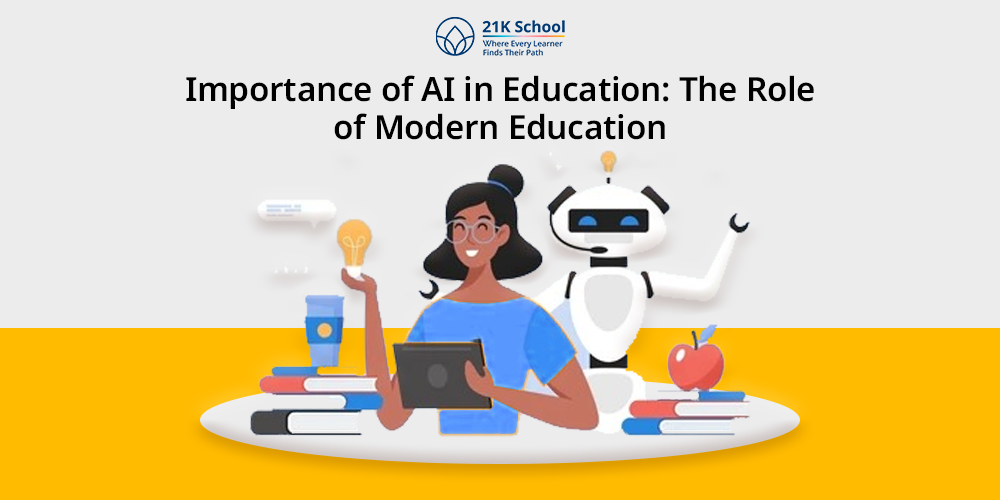
Online schooling has transformed education for all the stakeholders involved : students, teachers, parents and schools.
It provides students with the opportunity to learn from anywhere at any time and this flexibility makes it a very popular approach to education. It allows students to leverage digital platforms and tools to learn and evolve.
The introduction of online schooling platforms have made education more accessible, flexible and inclusive to students, parents and educators worldwide.
But this shift from traditional teaching methods to online schooling leaves us with many questions related to the nuances of online schooling.
Further in this article we will be exploring and addressing the most frequently asked questions regarding online schooling and provide a comprehensive understanding towards it.
Contents
- 1. Why is Online Education Gaining Popularity?
- 2. What is online schooling?
- 3. Who is online schooling suitable for?
- 4. Is the curriculum for online schools different from traditional schools?
- 5. How are exams and assessments conducted in online schooling?
- 6. Can online schooling prepare students for standardized tests and college admissions?
- 7. Are online schools accessible for students with disabilities?
- 8. Can online schooling replace in-person extracurricular activities?
- 9. What are the advantages of online schooling over traditional schooling?
- 10. How does online schooling support personalized learning?
- 11. Are there any cost benefits to choosing online education?
- 12. What challenges do students face in online schooling?
- 13. Are online schools accredited?
- 14. Will diplomas or certificates from online schools be recognized by colleges and employers?
- 15. How is technology shaping the future of online education?
- Conclusion
1. Why is Online Education Gaining Popularity?
Online education is gaining popularity among students and parents because of the attributes connected with it like:
- Flexibility
- Accessibility
- Adaptability
- Inclusivity
- Personalization and many more.
Unlike the traditional methods online platforms offer a tailored approach accommodating diverse schedule preferences and needs.
Additionally coconut 19 pandemic has accelerated the online education progress providing it a feasibility and effectiveness making it a more viable alternative to traditional classroom based learning.
It is also important to know: How do online schools work?
2. What is online schooling?
Online Schooling refers to an educational system where students learn with the help of digital platforms at the comfort of their home only with the support of internet access.
These lessons are delivered through lime or recorded sessions accompanied by discussion and assignments. These online schools can range from virtual schools to hybrid models combining online and in person learning both.
It is very important to understand why online education is here to stay . Parents juggling between traditional and online schooling options can read the blog that discusses the best online schools in India .
3. Who is online schooling suitable for?
Online schooling is ideal for students who need flexibility due to various reasons, such as:
- Frequent relocations (e.g., children of military families).
- Pursuit of professional careers, such as athletes or performers.
- Special educational needs that require personalized instruction.
- Health concerns that make traditional schooling challenging.
It also suits students who thrive in self-paced, technology-driven environments. - Home-Based Online Education Can Help Children With Social Anxiety
4. Is the curriculum for online schools different from traditional schools?
In most cases the curriculum from the online schools alliance with the traditional education standards and guideline many online schools follow state or National curriculum to ensure that students receive a comparable education however some schools offer additional flexibility such as elective courses, advanced placement program and modules tailored to students interest.
Some schools also offer courses from global curriculum like GCSE, IGCSE and IB.
Here’s a blog addressing concerns of parents of an online school curriculum .
5. How are exams and assessments conducted in online schooling?
It’s no doubt that online schools provide quality education and the exams and assessments in online schooling are conducted using digital tools and softwares integrated. These can include:
- Online quizzes with automated grading – like Google forms.
- Assignments and projects submitted through learning management systems (LMS), but it is very important to choose the right online learning platform .
- Proctored exams using software that monitors test environments to prevent cheating.
- Teachers may also assess students through participation in discussions, presentations, or other interactive activities.
6. Can online schooling prepare students for standardized tests and college admissions?
Yes online schools provide a comprehensive preparation for standardized tests such as CAT ACT and national board examination where students can prepare for examination with the help of resources, practice exams and counselling sessions for College via online platforms.
Students from accredited online schools are often considered equally eligible for college admission provided they meet the requirement from the academic and extracurricular benchmark.
7. Are online schools accessible for students with disabilities?
Online schools are designed to be inclusive and provide accommodation to students with special needs and disabilities.
Under special education features like screen reader, subtitles for video content and adjustable learning place and pace ensures accessibility for students with specific needs and supports them in their learning journey.
To know more about: Benefits of Inclusive Education
8. Can online schooling replace in-person extracurricular activities?
Online schooling activities may not offer the same in person extra curricular experience but it provides alternatives like virtual clubs, online competitions and workshops created to allow students to experience extra curricular activity in another manner.
As far as physical activities are concerned parents can supplement online schooling with local sports teams at classes and other community level programs to ensure a well rounded experience for students.
Here’s a blog on How Parents Can Contribute to Their Childs Online Learning .
9. What are the advantages of online schooling over traditional schooling?
Online schools offer several advantages to students in terms of their learning pace and making it accessible to students across geographical barriers some of the major advantages include:
- Flexibility
- Accessibility
- Personalization
- Cost effectiveness
- Diverse course offerings
The last few decades have seen significant growth and popularity for online education. Here is a blog discussing : how online education is better than classroom education .
And when we talk about online learning, it has revolutionised the education sector with advanced technology. There are multiple advantages of online learning that are offered to students, teachers and parents.
10. How does online schooling support personalized learning?
Online platforms used adaptive technology to cater to the different learning styles and faces of students making sure that they have access to additional resources such as videos, ebooks and practice exercises to track their progress.
During the times of hopelessness in people with different abilities, online School technology has renews interest in education for students by introducing them to courses and University education.
Teachers and students can leverage technology for online teaching methodology to keep them engaged and develop interest towards learning strategies: promoting personalised learning.
11. Are there any cost benefits to choosing online education?
Yes, online schools are more cost efficient than traditional schooling. It saves expenses on commuting, school uniforms and physical textbooks for students and parents making it a more affordable option.
Online schooling is more efficient and cost effective than all the alternatives available in the market for students as these platforms offer free or low cost programs making education more affordable and it is a more reliable method of investing in the learning journey for education of children.
There is a detailed block discussing how expensive education can change into affordable online education , as it discusses online education being a reasonable alternative to conventional brick and mortar institutions and universities.
12. What challenges do students face in online schooling?
The major challenges that a student’s face in online schooling includes:
- Screen fatigue
- Lack of social interaction
- Technical issues
- Self motivation
These challenges are mainly due to prolonged screen time which affects their physical and mental health and also somewhere impacts the social development due to limited human interaction.
These challenges exist due to the dependence of learning on the internet and technology where it requires a high degree of discipline to stay on track and use proactive measures to address all the challenges that are faced by students.
13. Are online schools accredited?
Before understanding the online dynamics of being accredited it is important to understand : what is accredited online school?
As this can help in understanding and selecting the best option for students making sure that educational journey stays relevant and addresses the quality of education for students.
Many online schools are accredited and recognised by educational bodies ensuring that they meet the quality standards though it is very important for parents to verify the status of online school before enrolling.
14. Will diplomas or certificates from online schools be recognized by colleges and employers?
Yes, diplomas or certificates from accredited online schools are widely recognized by colleges and employers.
It is very important to understand that Online Schooling will Change the Future of Education , and will help individuals in their professional journey with accurate skills and future preparedness.
15. How is technology shaping the future of online education?
Advancement in technology such as artificial intelligence, virtual reality and gamification has revolutionised education for students and made learning more interactive and personalized.
Technology decides the future trends in online education as it is expected to integrate seamlessly with traditional education creating a hybrid model which will provide an immersive experience to students by combining the best of both worlds.
Conclusion
In the past decade online schooling has emerged as a transformative approach towards education as it offers flexibility, accessibility and personalization in learning which outways the drawbacks of online schooling when implemented effectively.
These advancements come with their own concern which can be addressed proactively by parents and educators to ensure that students thrive in the online environment.
The seamless integration of technology continues to advance online schooling and shapes the future of education in the best possible way.



